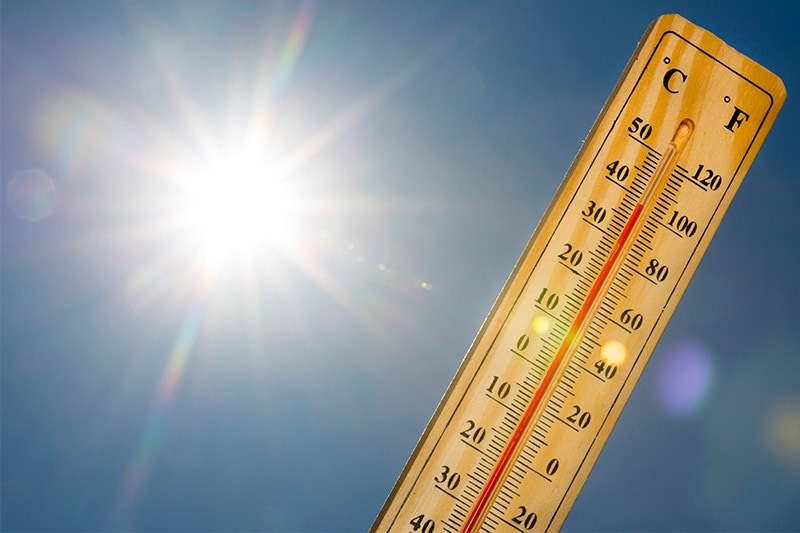Weather: How does extreme heat affect our brains?
July 1988. America's hottest month on record. The majority of the city's residents were on the beach, while the excessive use of air-conditioning equipment made electricity consumption extremely high.
Overheated vehicles broke down on several highways. The ice would melt before it could be eaten.
But other things were happening in that intense heat.
In fact, not only the summer of 1988, but also the record of violent incidents.
There were an unprecedented number of murders, rapes, armed robberies and assaults. That number was around 15 lakh 60 thousand.
For centuries, people have suspected that hot weather affects our behavior.
High crime in summer
The earliest studies date back to the late 19th century and are linked to crime statistics.
That analysis shows that crimes against people tend to increase in the summer months and property crimes tend to occur in the winter months.
Since then more evidence has been found.
Every year as the summer heats up we begin to notice a change. Some changes are simple.
People start honking when they get stuck in traffic, the police feel more disruptive, and we help strangers less.
But there are other worrying signs.
Summer of 2018
Global warming in 2018 led to famine and an unprecedented number of wildfires in the Arctic.
A species of deer washed up on the coast of Finland, and a mountain in Sweden fell in height.
A record number of emergency 999 calls were received in the UK and a police officer said people were behaving 'astoundingly'. In some areas, such telephones had increased by 40 percent.
Although all of these are based on experience, some academic research has also shown a large type of interrelationship.
Homicides increase with summer
Between April 2010 and 2018, 20°C temperatures were associated with 14 percent more violent crime than 10°C temperatures.
Mexico has been found to have more organized crime in the summer, and some researchers have noted that the weather may have given it a 'flavor of violence'.
Scientists have found that for every one degree rise in temperature in South Africa, the number of homicides increases by 1.5 percent.
A study in Greece found that more than 30 percent of 137 homicides in one area occurred on days with an average temperature above 25 degrees Celsius.
Similar developments have also occurred in Taiwan, America, Finland and Spain.
rebellion
A study of the years 1791 to 1880 found that most rebellions occurred during the summer months.
The same was observed from any corner of the earth. For example, Europe was more likely to have an uprising in July, while South America was more likely to occur in January.
Recent studies have further confirmed the relationship between social movements and weather. One analysis of 7,000 events over 36 years found that they are likely to become more violent as temperatures rise.
Last year, the riots erupted in the hottest summer week since the Netherlands began keeping records.
At that time, buildings were burned, explosives were thrown at the police and at least 27 people were arrested.
Risk of suicide
It has also been seen that there is an increase in the risk of self-harm due to external conditions.
More than 1.32 million studies conducted in 12 different countries have found that higher temperatures increase the risk of suicide. This was evident in South Africa and Western countries.
The highest risk temperature was found to be 27°C.
In Australia, people admitted to hospital increased by 7.3 per cent during the hot weather.
Why the weather causes such changes in our behavior is still a mystery, but scientists are trying to find the answer.
discomfort
One obvious possibility is that people feel uncomfortable in hot weather, which worsens their mood and prompts them to engage in lethal behavior.
For example, in the American Football League, players take aggressive penalties during the summer season.
Journalists also use negative language in their news stories and people quit their jobs in fights.
In 2017, scientists in Finland discovered that ambient temperature affects the amount of serotonin, an important brain chemical. The chemical affects anxiety, happiness and overall mood.
They found a strong correlation between their measure and monthly incidents of violence.
This suggests that temperature affects our serotonin levels, which in turn affects our levels of aggressive behavior.
Another hypothesis is that our testosterone levels increase during the summer, making us more aggressive. It also shows why sexual and domestic violence increases as the days get longer.
In America, physical, sexual and mental abuse called 'intimate partner violence' is 12 times more common in summer than in winter.
But there are other alternative reasons. These are statistics based on temperature and crime analysis only.
But this does not mean that one directly influences the other. When the sun rises we are in a world apart.
We enjoy crowded festivals, drink to socially acceptable levels throughout the day, and generally become more active. This increases all our activities.

Comments
Post a Comment
If you have any doubts. Please let me know.